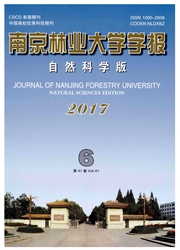

 中文摘要:
中文摘要:
为了分析叶绿素分子在太赫兹频段的吸收特性,也为探索生物样品的鉴定以及混合物成分测定的新方法,采用傅里叶变换红外光谱仪(FTIR)和密度泛函理论(density functional theory,DFT)研究了马尾松松针叶绿素以及叶绿素a和b标准样的太赫兹光谱。结果表明,萃取的马尾松松针叶绿素以及叶绿素a和b标准样在2.86THz频段均出现包络吸收峰。借助于密度泛函理论,计算了单分子叶绿素a和b的太赫兹光谱,计算结果表明叶绿素a在2.86 THz频段的包络吸收峰由叶绿素分子内的卟啉环和叶绿醇的振动和转动产生。由于理论计算采用单分子结构,与实验采用的叶绿素晶体结构存在差别,导致计算的叶绿素b分子虽然在2.86 THz频段有吸收峰,但是未呈现包络吸收特性,这表明除了分子内的相互作用力,分子间的弱相互作用力产生的振动和转动对于叶绿素b的太赫兹光谱吸收特性同样有重要的影响。
 英文摘要:
英文摘要:
This paper presents the investigation of the THz spectra of chlorophyll of masson pine leaf, chlorophyll a andb standard sample by using Fourier transform infrared spectroscopy(FTIR) and density functional theory(DFT), in or-der to study the vibration and rotation of chemical bonds in chlorophyll molecule at THz frequencies, which will be usedto identify the components in mixing biological samples. The frequency shift characteristic of THz spectra of chlorophylldue to the change of molecular structure will efficiently detect the development of pine wilt disease. The THz spectra ofthe extracted chlorophyll of masson pine leaf display a strong absorption at 2.86 THz, and weak absorption at the samefrequency occurs for chlorophyll a standard sample, and chlorophyll b standard sample, which originates from porphyrinring and phytol in the chlorophyll structure. In the other frequencies, the absorptions were not distinct. Based on the ab-sorption performance of chlorophyll, we can identify the mixing biological samples. We studied the theoretical mechanismof absorption frequencies for chlorophyll by terms of DFT. The calculated results indicate the vibration and rotation origi-nated from intermolecular interactions have more important effect on the THz absorption spectra compared with intramo-lecular interactions.
 同期刊论文项目
同期刊论文项目
 同项目期刊论文
同项目期刊论文
 Terahertz Spectra of L-Ascorbic Acid and Thiamine Hydrochloride studied by Terahertz Spectroscopy an
Terahertz Spectra of L-Ascorbic Acid and Thiamine Hydrochloride studied by Terahertz Spectroscopy an 期刊信息
期刊信息
